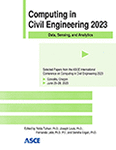Trust in Construction AI-Powered Collaborative Robots: A Qualitative Empirical Analysis
Publication: Computing in Civil Engineering 2023
ABSTRACT
Construction technology researchers and forward-thinking companies are experimenting with collaborative robots (aka cobots), powered by artificial intelligence (AI), to explore various automation scenarios as part of the digital transformation of the industry. Intelligent cobots are expected to be the dominant type of robots in the future of work in construction. However, the black-box nature of AI-powered cobots and unknown technical and psychological aspects of introducing them to job sites are precursors to trust challenges. By analyzing the results of semi-structured interviews with construction practitioners using grounded theory, this paper investigates the characteristics of trustworthy AI-powered cobots in construction. The study found that while the key trust factors identified in a systematic literature review—conducted previously by the authors—resonated with the field experts and end users, other factors such as financial considerations and the uncertainty associated with change were also significant barriers against trusting AI-powered cobots in construction.
Get full access to this article
View all available purchase options and get full access to this chapter.
REFERENCES
Afsari, K., S. Gupta, M. Afkhamiaghda, and Z. Lu. (2018). “Applications of Collaborative Industrial Robots in Building Construction.” In 54th ASC Annual International Conference Proceedings, 472–79.
Burden, A. G., G. A. Caldwell, and M. R. Guertler. (2022). “Towards Human–Robot Collaboration in Construction: Current Cobot Trends and Forecasts.” Construction Robotics, 1–12.
Calitz, A. P., P. Poisat, and M. Cullen. (2017). “The Future African Workplace: The Use of Collaborative Robots in Manufacturing.” SA Journal of Human Resource Management 15 (1): 1–11.
Emaminejad, N., and R. Akhavian. (2022). “Trustworthy AI and Robotics: Implications for the AEC Industry.” Automation in Construction 139: 104298.
Emaminejad, N., A. Maria North, and R. Akhavian. (2021). “Trust in AI and Implications for AEC Research: A Literature Analysis.” Computing in Civil Engineering 2021, 295–303.
Follini, C., V. Magnago, K. Freitag, M. Terzer, C. Marcher, M. Riedl, A. Giusti, and D. T. Matt. (2020). “Bim-Integrated Collaborative Robotics for Application in Building Construction and Maintenance.” Robotics 10 (1): 2.
Gregorio, S. D. (2003). “Teaching Grounded Theory with QSR NVivo.” Qualitative Research Journal, no. 2003: 79–95.
Jian, J.-Y., A. M. Bisantz, and C. G. Drury. (2000). “Foundations for an Empirically Determined Scale of Trust in Automated Systems.” International Journal of Cognitive Ergonomics 4 (1): 53–71.
Kluy, L., and E. Roesler. (2021). “Working with Industrial Cobots: The Influence of Reliability and Transparency on Perception and Trust.” In Proceedings of the Human Factors and Ergonomics Society Annual Meeting, 65:77–81. SAGE Publications Sage CA: Los Angeles, CA.
Ma, X., C. Mao, and G. Liu. (2022). “Can Robots Replace Human Beings?—Assessment on the Developmental Potential of Construction Robot.” Journal of Building Engineering 56: 104727.
Mara, M., K. Meyer, M. Heiml, H. Pichler, R. Haring, B. Krenn, S. Gross, B. Reiterer, and T. Layer-Wagner. (2021). “CoBot Studio VR: A Virtual Reality Game Environment for Transdisciplinary Research on Interpretability and Trust in Human-Robot Collaboration.” In Int. Workshop on Virtual, Augmented, and Mixed-Reality for Human-Robot Interaction (VAM-HRI 2021).
Michaelis, J. E., A. Siebert-Evenstone, D. W. Shaffer, and B. Mutlu. (2020). “Collaborative or Simply Uncaged? Understanding Human-Cobot Interactions in Automation.” In Proceedings of the 2020 CHI Conference on Human Factors in Computing Systems, 1–12.
Prassida, G. F., and U. Asfari. (2022). “A Conceptual Model for the Acceptance of Collaborative Robots in Industry 5.0.” Procedia Computer Science 197: 61–67.
Soliman, J. A., and M. M. Kan. (2004). “Grounded Theory and NVivo: Wars and Wins.” In International Conference on Qualitative Research in IT & IT in Qualitative Research. QualIT2004.
Veloso, M., J. Biswas, B. Coltin, S. Rosenthal, T. Kollar, C. Mericli, M. Samadi, S. Brandao, and R. Ventura. (2012). “Cobots: Collaborative Robots Servicing Multi-Floor Buildings.” In 2012 IEEE/RSJ International Conference on Intelligent Robots and Systems, 5446–47. IEEE.
Information & Authors
Information
Published In
History
Published online: Jan 25, 2024
ASCE Technical Topics:
- Analysis (by type)
- Artificial intelligence and machine learning
- Automation and robotics
- Business management
- Business organizations
- Computer programming
- Computing in civil engineering
- Construction companies
- Construction engineering
- Construction management
- Engineering fundamentals
- Field tests
- Human and behavioral factors
- Management methods
- Organizations
- Practice and Profession
- Quality control
- Quantitative analysis
- Systems engineering
- Tests (by type)
Authors
Metrics & Citations
Metrics
Citations
Download citation
If you have the appropriate software installed, you can download article citation data to the citation manager of your choice. Simply select your manager software from the list below and click Download.
